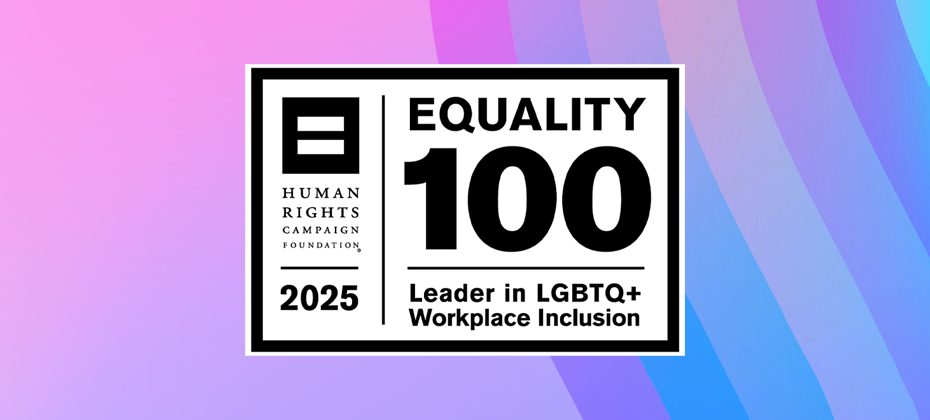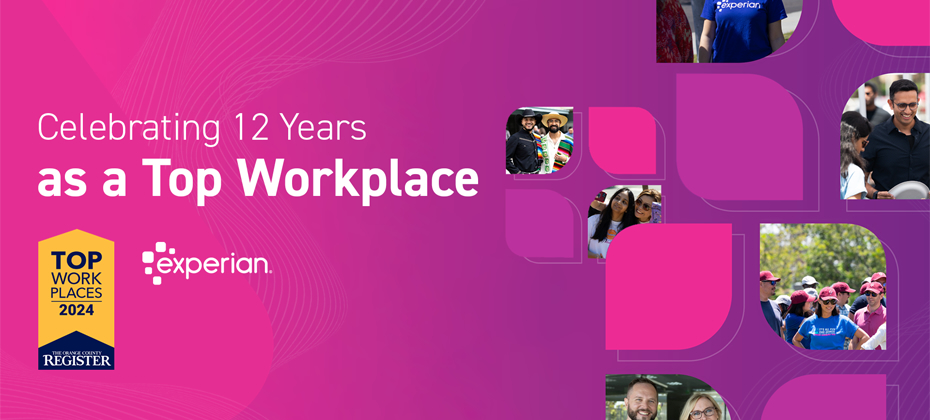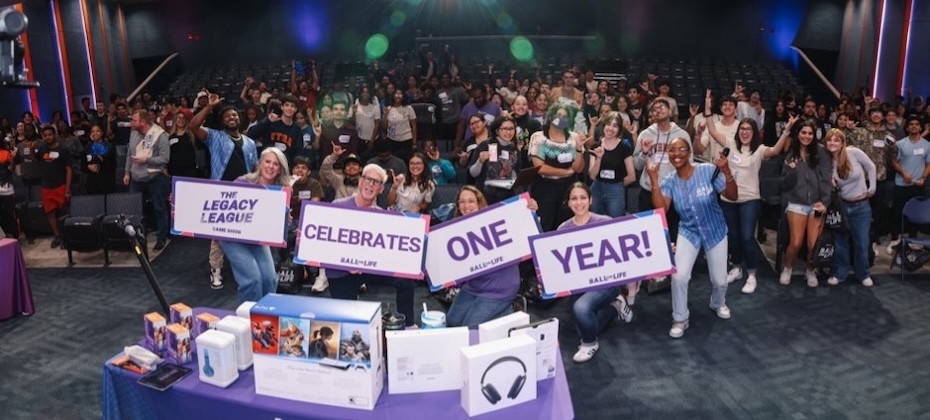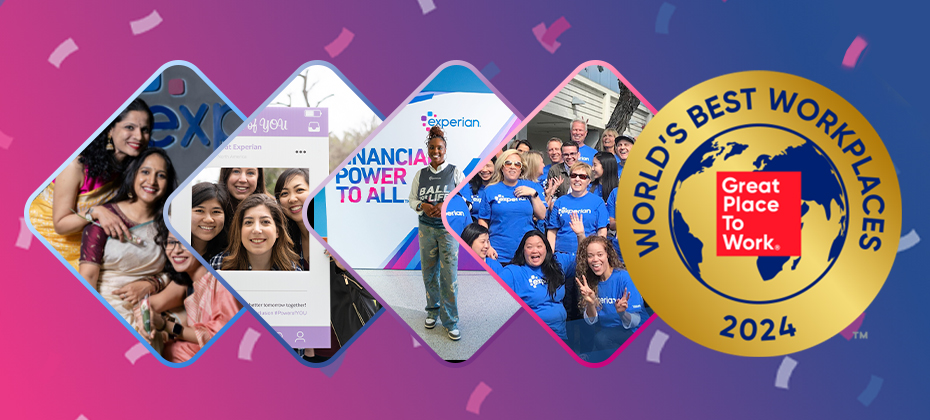At A Glance
At a Glance When an unknown printer took a galley of type and scrambled it to make a type 2ince the 1500s, when an unknown printer took a galley of type and scrambled it to make a type specimen book. It has survived not only five centuries, but also the leap into electronic typesetting, remaining essentially unchanged. It was popularised in the 1960s with the release ince the 1500s, when an unknown printer took a galley of type and scrambled it to make a type specimen book. It has survived not only five centuries, but also the leap into electronic typesetting, remaining essentially unchanged. It was popularised in the 1960s with the releaseince the 1500s, when an unknown printer took a galley of type and scrambled it to make a type specimen book. It has survived not only five centuries, but also the leap into electronic typesetting, remaining essentially unchanged. It was popularised in the 1960s with the releaseince the 1500s, when an unknown printer took a galley of type and scrambled it to make a type specimen book. It has survived not only five centuries, but also the leap into electronic typesetting, remaining essentially unchanged. It was popularised in the 1960s with the releaseince the 1500s, when an unknown printer took a galley of type and scrambled it to make a type specimen book. It has survived not only five centuries, but also the leap into electronic typesetting, remaining essentially unchanged. It was popularised in the 1960s with the release
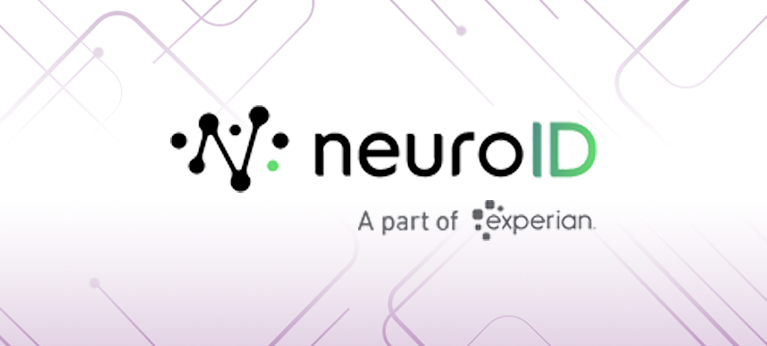
Amid the rise in usage of generative AI tools, companies across industries are looking for fraud detection strategies that enable them to combat sophisticated fraud schemes now and in the future. At Experian, we’re committed to ensuring our clients can make the most informed, data-driven decisions to protect the customers they serve while mitigating risk. To support this, today we’re excited to announce our acquisition of NeuroID – an industry leader in behavioral analytics. NeuroID combines the power of behavioral analytics with advanced device and network intelligence to create the first line of defense against malicious bots, bad actors, and fraud rings. This can help clients identify everything from identity theft to account takeover fraud from the very first interaction. NeuroID’s modern and frictionless capabilities amplify Experian’s fraud risk suite by providing a new layer of insight into digital behavioral signals and analytics observed for both new and returning users throughout the customer lifecycle. Together with NeuroID, we’re excited to build new blended offerings that detect risk but also empower businesses to confidently navigate the online landscape and trust in their transactions. Experian has a long legacy of providing award-winning fraud and identity solutions to protect companies and their customers. Last year alone, our identity verification and fraud prevention solutions helped clients avoid an estimated $15 billion in fraud losses globally. Adding NeuroID to the Experian family is another step in our commitment to continuous innovation in fighting fraud and helping clients and consumers keep pace with the evolving identity landscape. NeuroID’s behavioral analytics solutions are available now through CrossCore® on the Experian Ascend Technology Platform™ as a key fraud-detection capability. With NeuroID seamlessly integrated into Experian, clients can use one service provider to proactively monitor and analyze a user’s real-time digital behavior. To learn more, click here.
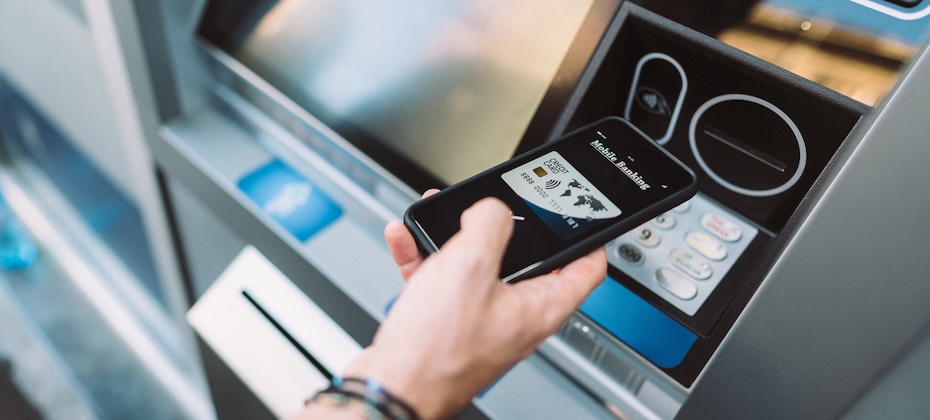
Amid some of the financial challenges that underserved communities experience, members across the financial services community remain committed to championing initiatives and programs that drive greater financial inclusion. In fact, collaboration has led to the inclusion of non-debt related payment information on consumers’ credit profiles, as well as digital services that make it easier to manage money. These efforts have helped to broaden access to fair and affordable financial resources for more individuals. While significant progress has been made, there is still more work to do. However, some of the misconceptions and myths about the financial services community are hindering further advancement. Debunking these myths will accelerate progress by building trust between the financial services community and consumers. Person withdrawing money from ATM contactless Myth #1: “Financial institutions have no interest in underserved consumers or credit invisibles.” The truth is, banks and credit unions want to say “yes” to more prospective borrowers, including individuals and families from underserved communities. Beyond being the right thing to do, it’s an opportunity to potentially build lifelong relationships with a relatively untapped market. A show of good faith to communities who have largely been ignored by the financial system could lead to customer loyalty that may extend to their family and friends. That’s why participants across the financial ecosystem have been proponents of including expanded data sources—such as on-time telecom, utility and video streaming service payments—on to consumer credit reports, as well as exploring other Fair Credit Reporting Act (FCRA)-regulated data sources, including payment data on short-term small dollar loans and expanded public records data. Making this data more accessible to lenders provides a more comprehensive view of a consumer’s ability and willingness to repay outstanding debt—an actionable solution to extending credit to consumers without lenders taking on additional risk. Myth #2: “There is a lack of trustworthy financial education resources.” The financial services community and affiliated organizations recognize that empowering people with financial knowledge and skillset are critical to consumers’ financial success. In fact, banks and credit unions are partnering with nonprofits and non-governmental organizations to better understand the unique challenges and opportunities within specific communities and provide relevant tools and resources. For example, Experian’s B.A.L.L. for Life (Be A Legacy Leader) program, launched in partnership with the National Urban League, serves as a catalyst for engaging with Black communities and low-income youth through live events and digital financial education. Subject matter experts, professional athletes, celebrities, and other influencers share their experiences and expertise, covering topics such as banking, credit, financial management and investing. In addition, to help people improve their financial management, Experian partners with the National Foundation for Credit Counseling (NFCC). The NFCC connects consumers with certified financial counselors to help them address various pain points, including debt management, homeownership, student loans or small business cash flow issues. Myth #3: “Underserved communities have few opportunities to build credit and enter the mainstream financial system.” People from underserved communities, as well as younger consumers and recent immigrants are often excluded from the mainstream financial system because they lack an extensive credit history. Historically, it’s created a vicious cycle; in order to get credit, you have to have credit. Fortunately, there has been a sea change in innovative solutions to address the specific needs of these populations. These include new credit scoring models and microfinancing which provide financial services to individuals who may have been excluded from traditional banking systems. In addition, by incorporating expanded data sources, such as telecom, utility and residential rental payments onto credit reports, lenders have more visibility into consumers who may have been excluded by traditional credit scoring methods.These programs help individuals and families from underserved communities establish and build a credit history that could enable loans, or the ability to rent an apartment or open their dream business. An example is Experian Boost®, a free feature that allows Experian members to contribute their history of making utility, cellphone, insurance, residential rent and video streaming service payments directly into their Experian credit profile. By incorporating nontraditional credit data like paying utility bills on time, online banking transactions, rental payments and verified income data, more people can establish a credit profile that can potentially qualify them for a loan. More Inclusion, Fewer Myths It’s encouraging that community organizations and banks are beginning to see the economic and social benefits of aligning on financial literacy and inclusion. As more initiatives come online, underserved populations will be able to establish a better financial foundation. Then, we can declare the myths to be history.
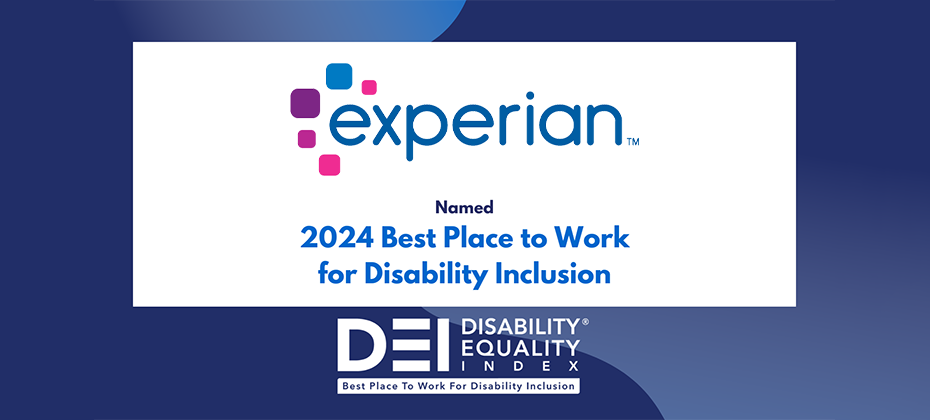
Experian is wrapping up several inspiring days at the 2024 Disability:IN Conference. We are a proud Presenting partner, and as part of our support this year, we had the honor of being the key sponsor for the NextGen Innovation Lab Pitch Competition. This initiative brings together young adults to develop innovative products or services that benefit individuals with disabilities. It provides a platform for young minds to harness their creativity and technical skills to solve real-world challenges faced by the disability community. This year, we challenged these NextGen leaders to create a product or service specifically for young adults with disabilities that can help them build their credit or improve their financial literacy. Only 10% of working aged people with disabilities consider themselves to be financially healthy, according to a recent study. Eight enthusiastic and passionate teams shared their ideas and the top two vote-getters’ pitched live, “Shark Tank” style, in front of thousands of conference attendees. The winner: Team 7’s “Experian Expedition,” which enhances the accessibility of the existing Experian app and adds new experiences such as an accessible credit card that also features braille; voice-guided, American Sign Language and closed-captioned exercises; and an incentive program for young adults as they reach various financial health milestones with cash back and coupons. We congratulate Team 7 and all of the teams for their collaboration with Experian and each other. The ideas and services developed through the NextGen iLab have the potential to make a significant impact on the disability community, enhancing accessibility, independence, and quality of life for millions. Sponsoring the NextGen iLab is just one of the many ways Experian is committed to disability inclusion. For the third consecutive year, Experian has achieved a top score in the Disability Equality Index (DEI) 2024. This accolade underscores Experian's ongoing efforts towards inclusivity in our workplace, products and services that are accessible and beneficial to individuals of all abilities, including the Support Hub, Financial Resilience Center, Inclusion Works, and the CMO/CCO Coalition. We’re proud our efforts are recognized by Disability:IN and the American Association of People with Disabilities (AAPD). To learn more about Experian’s commitment to inclusion, check out our Power of YOU Report 2024: Driving social impact and diversity, equity and inclusion in English, Portuguese and Spanish.

Generative AI is not just a technological advancement; it is the driving force behind a revolution in the financial services industry. At the recent VentureBeat Transform conference, financial industry leaders gathered to discuss the transformative potential of Generative AI. Among the panelists was Shri Santhanam, Executive Vice President and General Manager of Software, Platforms, and AI at Experian North America. The session, titled Generative AI: Crafting Smart Solutions for Financial Services, explored how generative AI is revolutionizing the finance sector by crafting intelligent solutions to address unique industry challenges. Santhanam highlighted the significant digital transformation within financial services, driven by AI and machine learning. "Generative AI is having a profound impact on many industries, including financial services," Santhanam stated. He emphasized that AI contributes to better financial inclusion, improved risk assessment, and enhanced customer experiences. Experian's Commitment to AI Innovation Experian has been at the forefront of AI integration, leveraging advanced technologies to drive productivity and enhance customer engagement. A prime example of this commitment is the Ascend Technology Platform, which democratizes access to AI tools for clients and Experian developers. Santhanam shared insights into Experian's strategic approach to AI adoption. "We invested early in production scale and are very careful about which projects to sponsor for go-to-market. These projects must pass a bar that includes strategic alignment, customization, and regulatory compliance," he explained. Real-World Applications and Future Directions Generative AI is poised to produce significant impacts, particularly in underwriting models, pattern recognition, and automation. Santhanam noted that Experian has made considerable strides in AI integration over the past 12 to 18 months, enhancing coding and engineering productivity among the extensive team of over 2,000 engineers. Additionally, AI-powered dialogues have elevated customer engagement, demonstrating the practical benefits of these technologies. One of the standout features of Experian's approach is the balance between innovation and regulation. Santhanam emphasized the importance of breaking down silos and fostering collaboration between risk and technology teams to navigate the complexities of AI adoption in highly regulated environments. Looking Forward Experian's dedication to responsible AI is evident in its establishment of an AI academy to accelerate upskilling and promote grassroots innovation. By encouraging employees to engage with generative AI and share their successes, Experian fosters a culture of continuous learning and experimentation. As AI continues to evolve, Experian remains committed to adapting to regulatory changes while ensuring fairness, transparency, and non-discrimination in their AI applications. We see tremendous opportunities in enhancing customer engagement, expanding financial inclusion, and streamlining processes through AI. In conclusion, Shri Santhanam's participation in the VentureBeat Transform panel underscores Experian's leadership in leveraging Generative AI to drive innovation and deliver tangible benefits to businesses and consumers. The Ascend Technology Platform exemplifies Experian's commitment to harnessing the power of AI responsibly, setting a benchmark for the financial services industry.
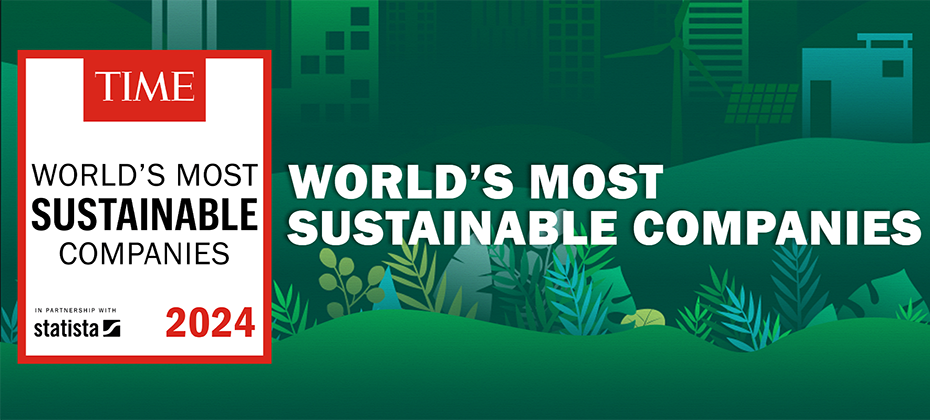
We are thrilled to announce that Experian has been named to TIME Magazine’s inaugural "World’s Most Sustainable Companies 2024" list, a testament to our ongoing commitment to environmental stewardship and sustainability leadership. This award is granted on a comprehensive research study conducted by Statista to identify the most sustainable companies across the globe, recognizing companies that are committed to preserving the planet and ensuring future generations inherit a world rich in natural beauty and resources. Experian achieved significant milestones in our sustainability journey in just the past year alone: Our renewable energy usage increased from 62% to an impressive 75%, marking a substantial step towards our goal of maximizing sustainable energy sources. We reduced our overall energy consumption by 19%, contributing to a remarkable 75% reduction, putting us well ahead of schedule in achieving our ambitious goal of a 50% reduction in direct emissions by 2030. As our business has grown, Experian has managed to decrease the carbon intensity of our direct emissions by an impressive 35%. This achievement underscores our dedication to operational efficiency and sustainable practices across our global operations. Looking beyond our direct impact, Experian has committed to working with suppliers that also adopt science-based targets by 2029, demonstrating our influence in driving sustainability throughout our supply chain. At Experian, sustainability is not just a corporate responsibility but a core part of our business strategy. We are dedicated to advancing environmental sustainability, driving positive change in our industry, and contributing to a healthier planet for future generations. As we continue on our journey to Net Zero, we remain committed to setting new benchmarks and leading by example in corporate sustainability. For more information on our sustainability initiatives and progress, click here.
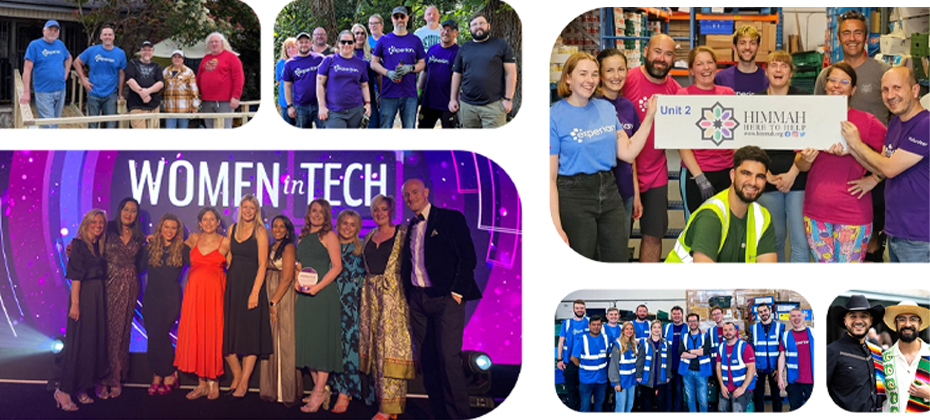
Making a real difference in the world starts with embracing Diversity, Equity, and Inclusion (DEI) and accelerating social impact. It's not just the right thing to do, but it's also key to our mission of creating a better tomorrow, together. DEI isn't just a buzzword for us; it's at the heart of everything we do. Whether it's in our sustainability strategy or our day-to-day operations, we're committed to driving positive social impact and closing the financial wealth gap in underserved communities. It starts with our people. We’re proud to share their dedication and work in this year’s Experian Power of YOU Report 2024: Driving social impact and diversity, equity and inclusion in English, Portuguese and Spanish. Within these pages, you’ll see how we foster belonging with our teammates, and champion DEI beyond the walls of Experian. From developing products like Experian Smart Money to expanding Experian Boost in the United Kingdom, and launching Advance XScore in Peru, we're dedicated to making a difference in the world around us. To that end, you’ll see we’ve also included, for the first time, our new Positive Social Impact Framework, which will reinforce and help our clients, consumers and employees further understand how we are making a difference in our communities. At Experian, we strive to build a brighter, more inclusive future – for our employees, our clients, and our communities. Together, we can make a real difference.

Caps and gowns. Pomp and circumstance. Loans and debt. As the class of 2024 celebrate their college graduations, more than 43 million of them leave school with a total national debt of more than $1.6 trillion. Some are on better financial footing than others – with no debts as they start their careers – because of early financial and credit education. These learnings fueled ideas for students from Historically Black Colleges and Universities (HBCUs) who competed in this year’s #IYKYK Pitch Competition (If You Know You Know), sponsored by HomeFree-USA and Experian. The challenge: to create solutions that help their peers become debt-free within five years of graduation. Here, finalists share some advice for graduates on how they can start their post-collegiate lives on solid financial footing: OLUWATOSIN OYEKEYE, Alabama State University You're not too young. I feel like most people think it's until you're married or you have kids before you should take your financial life seriously. From your first couple of first paychecks, look into where you can invest. If you don't want to live from paycheck to paycheck, look for ways to grow your money. Take your credit seriously. If you want to own a home, you want to buy a car, these things are important. It's not too early, it’s also not too late to start taking these things seriously. JAZMIN FELIZ ORELLANA, Bowie State University You don't have to start off with a credit card with a $10,000 limit. You can easily start off with a secured credit card. And that's actually one of my biggest pieces of advice. Get a credit card, be mindful with it, don't spend, don't max it out, but definitely just practice and start using it to see if you're actually able to maintain your credit. That's a piece of advice that definitely has worked with me, especially with building up my own credit, which I hope to get soon to 800. MARCUS HARRIS, North Carolina A&T University Always go out and explore opportunities that could first boost your credit and put you in a more financial-free state. For example, with Experian, they have an Experian Boost program that when you're in school, if you have rent, you rent an apartment, you could apply that. Or even the Netflix subscription, you can apply that to the Experian Boost program and therefore you can help build your credit over the time. TAYLOR PAYTON, Bowie State University To college students who are about to graduate, once they get that job offer with a lot of zeros behind it, be mindful of lifestyle influences. Just because you're making a certain amount of money does not mean you have to spend all of it. Be mindful not to keep up with the Joneses. CHIOMA KALU, Alabama State University There's something my sister used to say. She used to say, "Pay now, play later. Or if you play now, you pay later." I feel like if they focus during their youth when they can really do these things and really go out there, do the jobs, focus on paying off everything, getting that financial literacy, getting that financial freedom, and then at age 30 you're already set up for life. That makes more sense than just going through life, just ballin’, and then at the end of the day, if you have to pay when you're like 60? You're still paying student loans? Come on, now. CALVIN CHARLES III, Bowie State University Do not get caught up in social media. Just because you want to live in the city doesn't mean that that's what you have to do. And there's nothing wrong with roommates. They can allow you to reach your actual goals. Every meal does not have to be eaten out. Social media creates a lifestyle that you wish to live, and living in that moment is great, but you have to think about your future and building that wealth for yourself directly afterwards. All of these students were part of the Center for Financial Advancement Credit Academy. To learn more about this program that supports HBCU students, click here.

The challenge for financial institutions today is to understand the individuals who are applying for credit and to provide everyone with equitable opportunity to gain access to credit, provided they are an acceptable risk. In my current role as CEO of Experian Software Solutions, I am often reminded of my own journey as an immigrant to America who had to navigate the tests and complexities of establishing my financial identity and eligibility. I understand firsthand how inefficiencies caused in part by fragmented software systems have led to inflated costs, extended timelines, and elevated risks for financial institutions around the globe. Not to mention the profound impact this approach can have on consumers. At Experian, we recognize the need for change, which is why we developed Experian Ascend Platform™— an innovative solution designed to integrate critical functionalities seamlessly. Already, more than 1,500 clients globally are leveraging the platform, processing millions of transactions daily. Today, we’re unveiling new enhancements to the platform that bring together software tools for analytics, credit decisioning and fraud into a single interface — simplifying the deployment of analytical models and enabling businesses to optimize their practices more frequently, achieving greater efficacy with lower investment of time and money. Why does this matter? Well, consider the challenges faced by businesses, especially in the financial sector, when it comes to integrating various software solutions. “Complicated spaghetti” is what executives from some of the largest global banks have called it in conversations with me. Historically, achieving a synchronized experience across different tools and applications has been elusive to the industry. This fragmented approach not only stretches timelines unnecessarily but also raises security concerns and increases operational challenges and costs. Our enhanced platform addresses these pain points head-on. It dramatically reduces time to value while eliminating compliance risks and offers streamlined access to Experian's suite of integrated solutions and tools through a single sign-on and user-friendly, harmonized user interface. Moreover, it leverages generative AI to facilitate seamless automation, modernization, and efficiency across organizations of all sizes and experience levels without compromising human checks and controls. Our platform brings together worldclass Experian data, partner data and our clients' data with the software in one environment. There is no other platform on the market that offers the level of sophisticated integrations we do or that can "turn on" new solutions as quickly. To put it simply, it's a revolution for this industry. By combining analytics, decision-making, and fraud detection into a single platform, we're simplifying operations, enhancing security, and accelerating time to value for financial institutions worldwide. Let me give you an example. Lendr, a specialized fintech offering financing solutions for small businesses, has experienced firsthand the platform's transformative impact on agility, competitiveness, and informed decision-making. In fact, over the last year, the platform has already helped Lendr double their business. Our journey to developing the platform wasn't easy. It has required years of strategic collaboration with many of our most sophisticated clients, significant investments in technology, and a relentless pursuit of innovation. But the result is a platform that is revolutionizing the financial services industry and paving the way for a more inclusive, secure, and seamless financial future for all. As we continue this journey of transformation, I'm excited about the possibilities that lie ahead. With our integrated platform, we’re not just transforming the industry—we're empowering individuals and institutions to thrive.

We’ve reached a meaningful milestone with the launch of Experian Cashflow Attributes™. Now, lenders can tap into over 900 income, cashflow and affordability attributes from Experian across the customer lifecycle – which can provide a more accurate view of consumers’ financial health.

Innovation isn't just about creating the next big thing. It can solve problems, improve lives, and help businesses stay ahead in a rapidly changing world. So, what drives innovation? It starts with a culture of collaboration and entrepreneurship that inspires creativity. Our North America headquarters are in the center of Orange County, a community that fosters an environment where ideas flourish and partnerships thrive. For years, we’ve worked with Octane, a local non-profit organization focused on driving innovation and growth by connecting people, resources and capital to build a better future. Experian is committed to disrupting the status quo and supporting an environment where creativity can be unleashed. Armed with the power of data and the latest technologies, such as generative AI, we believe we can help better financial outcomes for the consumers and businesses we serve. I recently gave a keynote at Octane’s annual Tech Innovation Forum during OC Innovation Week, exploring how businesses can unleash creativity through the use of generative AI and highlighting five tenets companies can consider for the responsible use of generative AI, including: Engage with purpose: It’s important that companies identify their purpose in using the technology and how it can positively impact their business, employees and customers. They should start with creating a plan, including deciding who will be using AI, what jobs need to be done, what guidelines need to be set and a review process. Elevate creativity and drive automation: Businesses should harness AI to automate processes that are mundane or labor-intensive to enable employees to focus more of their time and energy on creativity. Excite, educate, and train employees: To ensure all employees understand the potential of generative AI, businesses should prioritize education and training for all employees from the start. This includes finding evangelists of the new technology within the company to stay up-to-date on the latest news and get teams excited about the possibilities. Ensure ethical, compliant and responsible use: In addition to employee trainings, it’s important to set up a group of leaders, such as a risk council, that can handle ongoing opportunities and risks and codify guidelines on the ethical usage of AI. Embrace change and be agile: With any new technology, companies need to be agile and ready to adapt to whatever changes may come. It’s important to foster a culture of learning to constantly evolve the generative AI landscape for the company and its clients. Innovation can fuel economic growth, drive progress, and shape the future. We’re dedicated to fostering a culture of innovation and collaboration that creates opportunities for generations to come. Photo by © Octane/Michael Baker
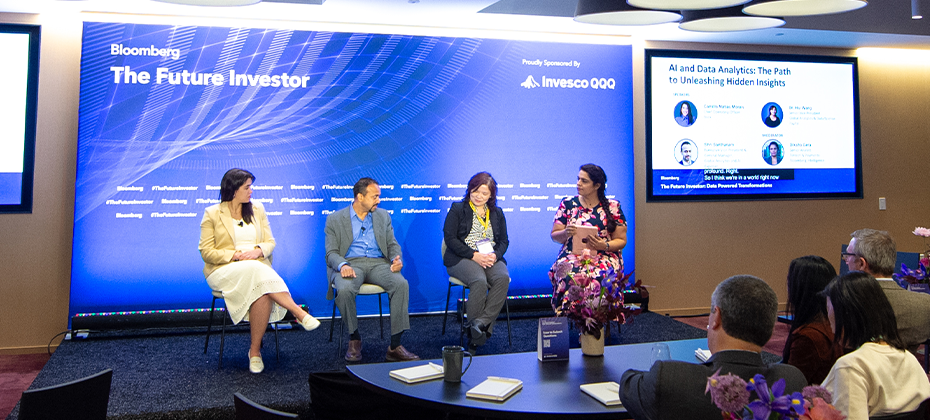
In a panel discussion at a Bloomberg-hosted panel titled "AI and Data Analytics: The Path to Unleashing Hidden Insights," Diksha Gera, a Senior Analyst at Bloomberg Intelligence, moderated a session that included key insights from Shri Santhanam, Executive Vice President and General Manager of Software, Platforms, and AI at Experian. Santhanam shared his thoughts on the transformative influence of generative AI (GenAI) within the financial sector, underlining its potential to revolutionize traditional practices. Enhancing Core Processes Santhanam illustrated how GenAI is altering the landscape of financial institutions. By automating intricate tasks, improving customer interactions, and expediting product development, this technology is pivotal. It transforms time-intensive tasks into more efficient processes, significantly enhancing productivity. This shift allows employees to focus on more strategic, higher-value work, thereby boosting the overall efficiency of financial institutions. Managing Risks and Ensuring Compliance With the adoption of GenAI comes a host of inherent risks—privacy concerns, data integrity issues, and challenges in regulatory compliance. Santhanam underscored the critical need to balance these innovative strides with stringent security measures that protect customer data and comply with existing regulations. The commitment to aligning practices with regulatory standards and ethical guidelines is paramount as the financial sector continues to integrate AI into its core operations. Governance and Collaboration Effective governance is essential for the successful deployment of GenAI in finance. Santhanam advocated for a collaborative approach that includes risk management, legal, and technical teams. The development of robust governance frameworks supports ethical and compliant AI applications, which are crucial for fostering responsible innovation within the industry. The Future of GenAI Looking forward, Santhanam pointed to several trends that are shaping the future of GenAI in the financial sector. These include pressures to reduce costs, increased demand for personalization, and the necessity for user-friendly interfaces. GenAI is set to play a key role in delivering personalized, efficient, and accessible financial services that respond to the evolving needs of customers. These insightful discussions, spearheaded by industry leaders like Bloomberg and moderated by experts such as Diksha Gera, emphasize Experian's leading role in navigating the potential and challenges of AI in financial services. The journey towards a more innovative and inclusive financial ecosystem is well underway, driven by the transformative capabilities of GenAI.

Building a strong foundation is key in maintaining your financial health. Here are 5 free resources for your personal finance journey.
